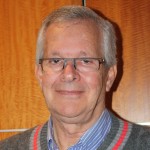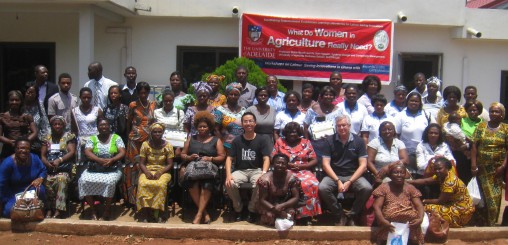
When Professor Ockie Bosch applied for a coveted grant from the Bill and Melinda Gates Foundation, he was allowed just two pages to make his case stand out among the thousands of other applicants.
The Gates Foundation had called for ‘bold’ and ‘wild’ ideas for labour-saving innovations for women small-holder farmers in developing countries. What Professor Bosch and his colleague Dr Nam Nguyen proposed was not a clever new farming device or machine – but a new way of thinking.

Their winning application, which was one of just 11 successful bids from 45,000 applications, argued the need to use systems thinking to identify the key issues that affected the women’s work and lives. With their grant, they worked with rural communities in Ghana and Vietnam using their systems process called Evolutionary Learning Laboratories (ELLab).
A voice for all
ELLab is a generic process that can tackle any complex issue. It involves all stakeholders mapping their mental models – that is, their personal views of the key issues, barriers and possible solutions.
“The key philosophy behind ELLab is enhancing cross-sectoral communication and collaboration,” Professor Bosch said. “The only way that people learn how to communicate across sectors is through sharing their mental models.”
Everyone has the same level of power when identifying the issues – from the taxi driver through to the most senior politician – so people are able to hear views they may not have heard before and silos are broken down.
Professor Bosch and Dr Nguyen, from the University of Adelaide Business School, explained this systems approach to tackling complex problems in a recent workshop conducted with The Australian Prevention Partnership Centre.
Sustainable change
Professor Bosch said systems thinking, which means finding solutions by tackling multiple parts of a problem at once, is increasingly seen as a new way to understand and manage complex problems at a local and global level.
Traditional linear thinking often ended up addressing just the symptoms of complex problems via quick fixes. This approach did not intervene in the root causes of problems, which in many cases meant any positive changes would not be sustainable, he said.
“Rather than just tackling the tip of the iceberg, systems thinking delves deeper and identifies the fundamental and interconnecting causes of complex issues,” Professor Bosch said.
The Partnership Centre is developing systems approaches to lifestyle-related chronic health problems and wanted to see ELLab in action.
Professor Alan Shiell, who heads the Partnership Centre’s Systems Science and Implementation Capacity, said ELLab provided a framework to deal with the complexity of public health issues without being “paralysed by it or diverted into short-term fixes that fail in the longer term”.
“It promises to improve the effectiveness of public health practice, and this is central to the Partnership Centre’s mission,” Professor Shiell said.
For the women farmers in Ghana, looking at the problem systemically showed the key priority was improving the quality of their lives, rather than just labour-saving innovations. Their core issues include difficulties accessing markets, ensuring quality produce, insufficient farming implements and lack of knowledge in various aspects of their farming practices.

Sharing the knowledge
With increasing interest in ELLab, Professor Bosch and Dr Nguyen are working within a larger team to develop a web-based platform called Think2Impact, where people can learn online how to run a systems workshop.
Professor Bosch and Dr Nguyen have used ELLab to tackle diverse issues around the world, from a child safety project in Japan and a tree density program in northern Queensland to a governance plan for Haiphong City, Vietnam.
Professor Bosch has found that communities across the world are willing and able to think systemically – to unravel the many interacting factors that make up their complex issue and to find solutions that consider the delicate balance of all these factors.
“We publish a lot about our work, but to me it is most satisfying taking our science out to the people where it can make a difference to their lives,” Professor Bosch said.
By Marge Overs, Communications Manager, The Australian Prevention Partnership Centre
Find out more
- Read about the work of The Australian Prevention Partnership Centre
